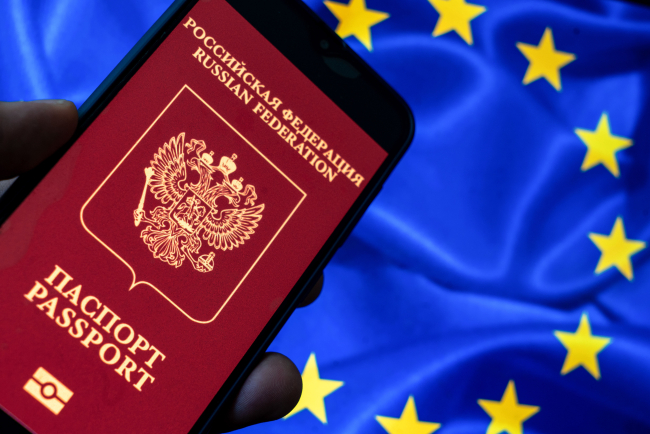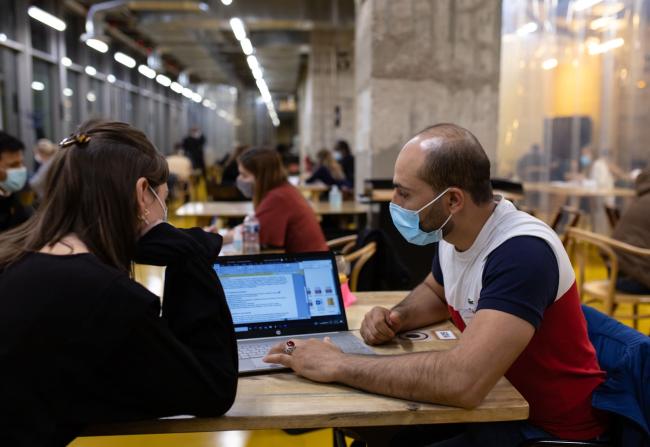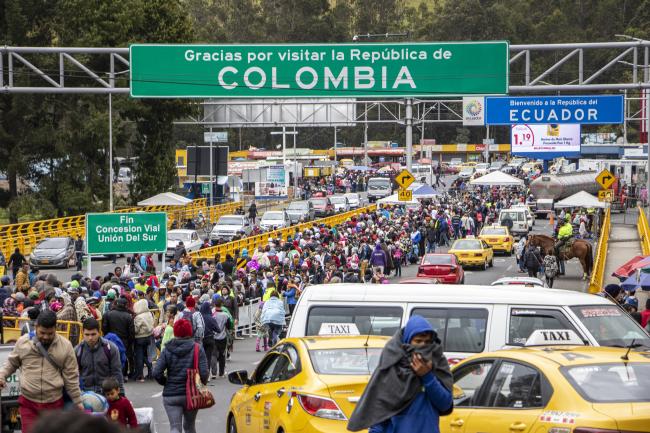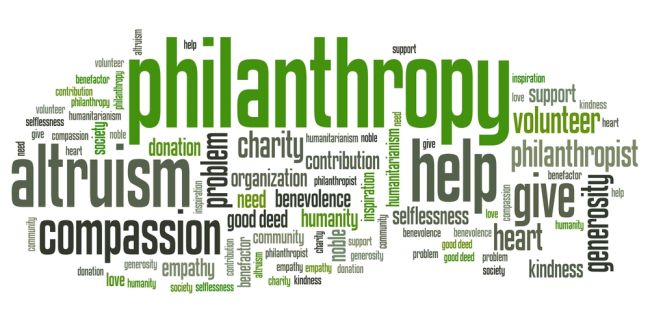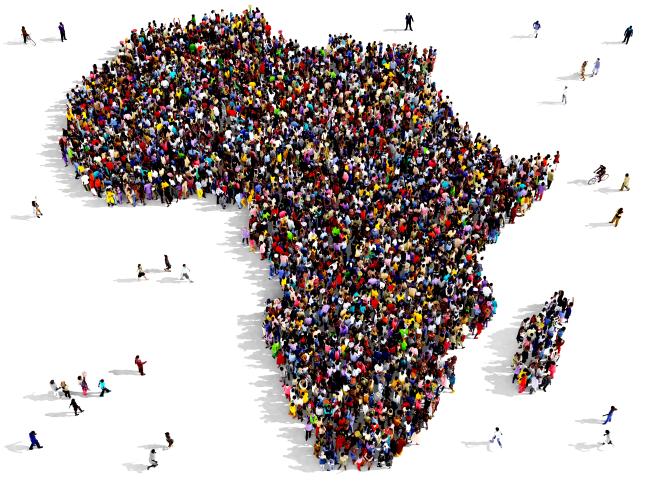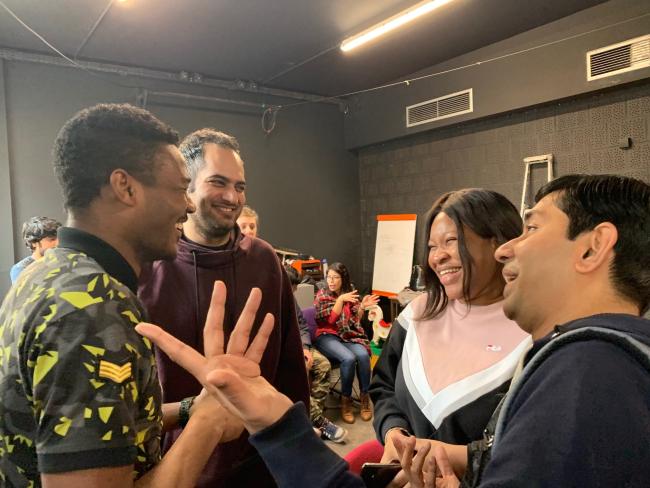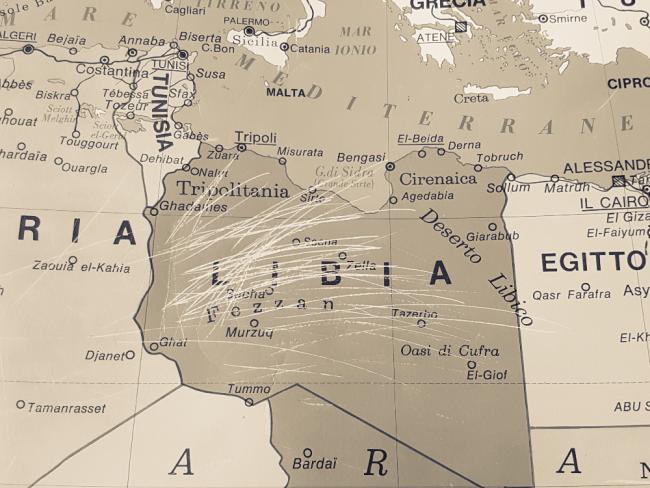The New Russian Diaspora: Europe’s Challenge and Opportunity
This report assesses both the scale and the roots of the outward migration from the Russian Federation coinciding with Putin’s turning of Russia into an aggressive authoritarian state.

European Union: A Geopolitical Illusion?
The European Union (EU) is holding firm in the face of the war in Ukraine—perhaps better than expected. But what long-term effects will the war have on European institutions and policies? The institutions will need to be changed to cope with the forthcoming expansions. The EU has certainly made progress toward common industrial and technological policies. But will this dynamic do away with a conception of strategic autonomy, encompassing both diplomacy and strategy? The European Union, which will undoubtedly be a key mover of future changes for the continent, remains largely uncertain in terms of its future configurations.
Between Inertia and Openness. Germany Reforms Its Labor Immigration System
With its new Skilled Immigration Act (Fachkräfteeinwanderungsgesetz) of 23 June 2023, Germany aims to become the country with "the most modern immigration law in Europe". A new points system and new entry rules for experienced workers having a degree from their home country demonstrate the willingness of the German government to open up its labor market to third-country nationals. While immigration law was already the subject of a previous reform in 2020, the new law is a real paradigm shift in Germany’s migration policy.
The Employment of Refugees – From Career Pathways to Company Recruitment Policies
The issues of employment and work for refugees have received increasing attention from both the political, NGO and economic spheres in France since 2017, but few studies have yet to address this subject. This study was born out of cooperation between the Observatory on Immigration and Asylum and the “Work with Refugees” collective, that brings together several French NGOs supporting refugees and asylum seekers into employment.
Displaced Venezuelans in Latin America: A Test of Regional Solidarity?
Since 2015, South American countries have been dealing with the greatest forced displacement in their history. More than 5.6 million Venezuelans have left their country under great hardships, fleeing deteriorating living conditions, famine, and lack of access to medical treatment and basic care. Eighty per cent of these people have gone to other South American countries, such as Colombia, Peru, Ecuador, or Chile.
Philanthropy and Migration in Europe: What Role for Foundations?
The 2015 “crisis” accelerated and/or intensified the involvement of foundations (in particular those from the private sector) in the field of migration. The crisis not only created a sense of urgency, but also generated a movement of public empathy that foundations were willing to accompany and amplify. It was also seen as a challenge to Europe and its humanist values, which foundations sought to defend in accordance with their own beliefs in inclusive societies.
European asylum and immigration policy: what role for the Franco-German couple?
EU policy on migration and asylum is being built for the last 20 years. But this process is today on hold although France and Germany support the same position on this matter. However, the “migration crisis” in 2015 highlighted the weakness of the Franco-German alliance and the extend to which France’s support to Germany was timid although Germany was facing an extraordinary circumstances.
The African Union’s Migration Agenda: An Alternative to European Priorities in Africa?
While migration from Africa is the priority of European policies for the control of the European Union’s external borders, African migration dynamics are above all regional. Sub-Saharan migration is poorly connected to transcontinental flows: more than 70% remain in Africa.
How the French Understand Immigrant Integration and Citizenship
On December 9, 2020 will be celebrated the 115th anniversary of the 1905 law on French secularism (laïcité). On the very same day, a new law project will be presented by the French government, with the objective of further strengthening the “republican values” in order to fight against so-called “Islamist separatism” within French society.
Migrant and Refugee Participation: Approaches to Rethinking Integration Policies
In France, people participating in policies and programs that affect them is not a new concept. It has been widely studied in the field of social work and the fight against poverty, and is at the heart of many experiments. How can this concept of participation, as is outlined for people experiencing poverty, be applied to refugees and migrants? Does the participation of refugees and migrants present specific characteristics?
"Playing with Molecules": The Italian Approach to Libya
This paper aims to analyse the many ways in which Italy is trying to play with the many Libyan “molecules”, the different parties of a fragmented and collapsing country, and the possible implications of the strategy adopted by the Gentiloni government and its Minister of Interior, Marco Minniti, towards the country and the migratory crisis.
The Changing Face of Migration Flows
Migration continues to be an integral part of the political landscape in several European capitals, especially at a time when national or local elections are approaching. Nearly all EU member states are under pressure in one way or another from external challenges, but some are under constant pressure from migration flows.
Migration Flows and Policies: India at a Turning Point
India hosts millions of economic migrants from neighboring countries, especially Nepal and Bangladesh. It is also a haven for large refugee communities from Tibet or Sri Lanka. In the past years, India’s dynamic economic growth has brought in new types of migrants: young European graduates, entrepreneurs and highly skilled Indian migrants returning home.
Are Europe's Migration Funds Adequate to Meet Growing Challenges?
Europe’s history books have always identified the Mediterranean as a bridge between different civilisations and cultures. Scholars, such as Fernand Braudel, have portrayed the Mediterranean as the bedrock of Western culture from which dialogue, mutual understanding and trade have been promoted since the very origins of our civilisation.
Emerging Markets and Migration Policy: China
China’s development has given rise to massive flows of both domestic migration and international emigration.
Temporary Workers or Permanent Migrants? The Kafala System and Contestations over Residency in the Arab Gulf States
The Arab Gulf is the third largest receiving region for global migrants (after North America and the European Union). The six states of the Gulf Corporation Council (GCC) are the richest Arab economies, boast some of the highest GDP per capita rankings in the world, and they all depend upon guest workers in virtually every economic sector. Guest workers have played an integral role in the Gulf since the 1970s, supplying the skills and manpower needed to implement ambitious development plans.
Linking Business and Migration Policy in the USA
On Friday, the 13th of January, 2012, the Center for Migrations and Citizenship welcomed Jesus 'Chuy' Garcia - Cook County Commissioner, Chicago (USA) - as a speaker of its international conference "Business and the State: Migration Policies, Diversity and Integration".

European Task Force on Irregular Migrations - Country Report: Germany
From a European comparative perspective, Germany represents the case of a highly restrictive migration control regime. Between 400,000 and 600,000 migrants live in the country without legal resident status. Their access to social rights such as health care and education is severely restricted, and individual or collective regularization channels do not exist.

European Task Force on Irregular Migrations - Country Report: Italy
In order to understand the present configuration of immigration policies in Italy, it is necessary to follow a path of double logic at every step of the analysis. On one side, the study will identify consistent trends in the country’s “immigration history” that continue to shape the main features of the reality of immigration today (see §§ 2.1 and 2.2). On the other side, the study will focus on major changes in the regulation of immigration and the policies addressing undocumented migrants that occurred in more recent times (see § 2.3.).

European Task Force on Irregular Migrations - Country Report: France
Looking back since the end of the 1970’s, French immigration policy has been characterised by an increased toughening, both on the outside, through greater border control and an increasingly strict asylum policy, and on the inside, with a progressive criminalisation of irregularity.
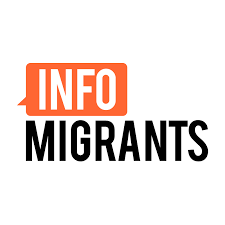

France: 'Precarious' employment conditions for refugees
Around 42% of refugees settled in France manage to find a job within a year of obtaining official status. But the jobs they find are often far below their skill levels, resulting in a "professional downgrade" that leads to discontent and exhaustion.


Why do migrants still leave northern France to head to UK?
Migrants who head to the United Kingdom often see it less as a panacea than a last-ditch means-to-an-end, according to Matthieu Tardis, an expert in migration policy at the French Institute of International Relations (IFRI).

Calais Migrant Crisis: Refugees Risk Their Lives To Leaves France For UK
The distance between Dover, England, and Calais, France, is only 30 miles. For migrants and refugees trying to cross from France to Britain through a tunnel underneath the English Channel, however, that short distance represents a dangerous journey and a risk of deportation, grave injury and even death.
Interview with David Miliband, President and CEO of the International Rescue Committee
Can you describe the humanitarian impact of the war in Ukraine, in Europe, including with regards to displacement, and beyond the outside of Europe?
EU border crisis : an interview with Matthieu Tardis
Matthieu Tardis, Research Fellow at the Center for Migration and Citizenship spoke about the European Union's migration policy and the crisis at the Turkish-Greek border on Euronews's program, Now.
Migration in Eastern Africa: Regional Challenge, Global Issue
An interview with Jeffrey LABOVITZ, International Organization for Migration (IOM) Nairobi Regional Director
Support independent French research
Ifri, a foundation recognized as being of public utility, relies largely on private donors – companies and individuals – to guarantee its sustainability and intellectual independence. Through their funding, donors help maintain the Institute's position among the world's leading think tanks. By benefiting from an internationally recognized network and expertise, donors refine their understanding of geopolitical risk and its consequences on global politics and the economy. In 2025, Ifri supports more than 80 French and foreign companies and organizations.








